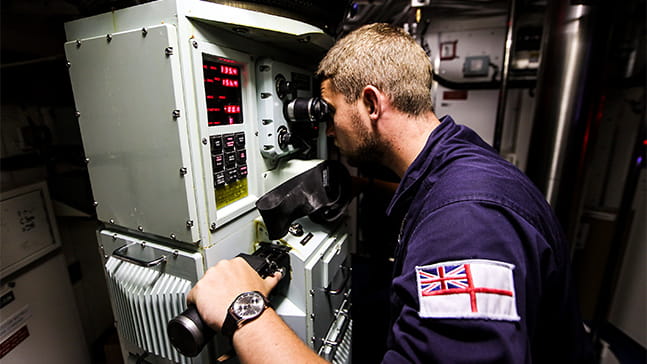Weapon Engineer Officer (Submariner)
You’ll lead a team of specialist engineers on one of two types of cutting-edge submarines, on highly classified global missions.
- £31,000 - £110,500
- Undergraduate Degree
- Submarine Service
- Engineering
- Officer level
£5,000
£31,304
£44,456
£27,000
6 weeks
Chartership

I’m part of one of the Royal Navy’s most elite teams, which is a great feeling. The kit we work with is incredible, and I get a real sense of satisfaction when we all pull together to solve a problem.
Role details
What you’ll do
Being a Weapon Engineer Officer (Submariner) means leading a team of skilled engineers on some of the Royal Navy’s most top secret missions. You could be on board a Vanguard-class submarine, where you’ll ensure the ballistic missiles that are our nation’s nuclear deterrent can be fired quickly and accurately, or guaranteeing the performance of cutting-edge radar and detection systems on a hunter killer boat.
Whatever the operation, below the surface, teamwork is key. You’ll need to combine your first-class engineering knowledge with personal skills, as you take responsibility for the submarine’s potency as a state-of-the-art fighting machine. It’s a job that is hugely important, which is why you’ll get a £27,000 bonus just for joining and an extra £5,000 for qualifying as a Submariner.
Your role
- Lead a team of up to 60 skilled engineers, from specialists in communications and IT, to those with a unique knowledge of explosives and electronic sensor systems.
- You’re the person who is responsible for the performance of our weapons, radar and detection systems, overseeing their maintenance and preparation so that we’re ready for anything.
- Take responsibility for some of the world’s most advanced defence systems, using, developing and adapting your engineering knowledge in highly-challenging environments that are unique to Royal Navy life.
- Take advantage of wide-ranging career development opportunities, from becoming a Chartered Engineer, to working alongside industry partners on equipment development projects.
Pay & benefits
- A starting salary of at least £31,304, rising to approximately £44,456 after two years
- A £27,000 joining bonus
- An extra £5,000 bonus on being awarded your Dolphins – the mark of a qualified Submariner
- Additional pay starting at over £1200 per month at sea once qualified as a Submariner
- An excellent non-contributory pension scheme – we pay into it for you, so you don’t have to sacrifice any salary
- Six weeks of paid holiday every year
- Forces Help to Buy scheme – a 0% loan to get you on, or further up, the housing ladder
- Subsidised travel, accommodation and food
- Handy discounts with lots of top brands, from Marriott hotels to Audi cars and high street stores
- Amazing opportunities, including world travel and adventurous training for two weeks every year
Skills for life
Qualifications you'll gain
- Become an internationally recognised Chartered Engineer – we’ll support your registration.
Opportunities open to you
- Post graduate qualifications including an MSc in Guided Weapon Systems, Cyber Defence Information and Assurance, Explosive Ordnance Engineering, or Programme and Project Management are possible if you’re committed to progressing academically.
Skills you'll develop
- Learn to work efficiently in a highly pressurised environment – no two days are ever the same.
- Mentor junior personnel and oversee complex projects.
- Gain an in-depth knowledge of weapon systems, radars and other detection equipment.
- Build a deep understanding nuclear engineering and physics.
Eligibility
- You’ll need to be aged 18 to 39
- All Science, Technology, Engineering and Mathematics (STEM) degrees will be considered
- You’ll need a minimum of 96 UCAS points. At least 64 points should be in maths and an engineering-based science. These can be accrued from either GCE A/AS Levels (or equivalent) or National Diplomas (e.g., BTEC)
- You'll need at least 5 GCSEs at grades A*-C (9-4) (or Scottish equivalent) which must include English Language and Mathematics
- You must be a United Kingdom citizen or British Dual National. Dual Nationality restrictions do apply
- You must have lived in the UK for 5 years continuously prior to application
- A minimum height of 157cm
- A Body Mass Index (BMI) between 18 and 28 (between 17 and 27 if under 18)
Skills & interests
- Learn to work in an ever-changing environment where no two days are the same, mentoring junior personnel and overseeing complex projects.
- Gain an in-depth knowledge of weapon systems, radars and other detection equipment, while also understanding nuclear engineering and physics.
Joining process
From picking your role to the first day of training; everything you need to know as an officer
Submit an application
Defence Aptitude Assessment (DAA)
You’ll be tested on: Verbal Reasoning, Numerical Reasoning, Work Rate, Spatial Reasoning, Electrical Comprehension and Mechanical Comprehension.
To prepare, you can practise the DAA
Interview
Medical and eye tests
Pre-Joining Fitness Test (PJFT)
This involves completing a 2.4km run on a treadmill within a certain time, at a fitness centre near you
<SPAN id=docs-internal-guid-30bc2b2c-66ae-d3c9-d704-655f4f0697ab style="COLOR: #262626">Interview</SPAN>
Admiralty Interview Board (AIB)
This stage is unique to officers and takes place in two parts. A Pre Recorded Interview (PRI) is an online assessment which assesses your motivation to join the Royal Navy as an officer and your awareness of the Royal Navy. The Group Planning Exercise (GPE) is the second stage of the AIB and is an online competency based assessment which will take place on a separate day to the PRI. It will be conducted in a virtual group environment and you will be assessed on your contribution to the team based on your individual performance
Career progression
Got a question?
Our virtual recruiter is available to answer your questions 24 hours a day
